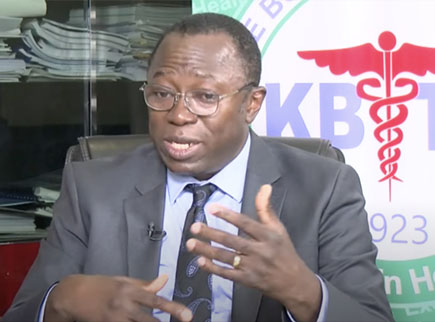Dr. Opoku Ampomah, the CEO of Korle Bu Teaching Hospital, Ghana’s top referral hospital, has expressed alarm over the rising number of medical professionals who are leaving the nation.
He declared that this problem, which is having a negative impact on the hospital, requires immediate attention.
Dr. Ampomah remarked, “Doctors and nurses are too eager to leave, and they are leaving,” during a Wednesday appearance on Joy News’ PM Express.
“There are push and pull factors, so once you have a situation where better conditions are being offered elsewhere, people move to those places because they feel they can make more financially.”
He said, “We’ve had several doctors leaving, and so far, the numbers that have left are concerning,” in reference to the present state of affairs at the hospital.
We are worried about this tendency because we currently have a sufficient quantity of employees to work with. However, I believe that in order to stop the tide, we must act quickly.”
He went on to say that the impact is determined by who is leaving as much as by the sheer volume of people departing.
“You might find that there isn’t much of a difference if you focus only on the overall number of nurses. Nevertheless, if you consider the individuals departing on a qualitative level, it’s as though an entire institution has vanished if an ICU nurse with more than 15 years of experience does so.”
According to Dr. Ampomah, the West and nearby private clinics are luring these seasoned medical personnel away from the nation.
The head of one of the largest nursing organizations in the world claims that the recruitment of nurses by wealthy countries from developing countries is “out of control.”
According to a BBC report, more than 1,200 nurses from Ghana enrolled in the UK’s nursing register in 2022 as the National Health Service (NHS) depends more and more on workers from non-EU nations to cover openings.
Even though the UK maintains that active recruitment is prohibited in Ghana, social media makes it simple for nurses to view job openings in NHS trusts and submit direct applications. The severe economic circumstances in Ghana also serve as a significant motivator.
A worrying trend is highlighted in the most recent Ghana Human Development Report: a considerable number of healthcare professionals are leaving Ghana as a result of unfavorable working conditions.
The United Nations Development Program (UNDP), the Statistical Service, and the National Development Planning Commission collaborated to produce the report, “The Future Value of Work in Ghana,” which shows that 24% of nurses with local training and 50% of doctors have left Ghana for foreign countries.
According to the report, if quick action isn’t taken, this migration might seriously threaten Ghana’s healthcare system and cause it to collapse.
Dr. Ampomah clarified that Korle Bu is making efforts to keep its employees.
“We at Korle Bu came to the conclusion that one of the reasons our nurses weren’t happy was that, once they attained the level of principal nursing officer, there were restrictions on their ability to advance to higher grades.
“Last year, for instance, we created about 110 new deputy chief nursing officer positions, so that allows those who have been marking time at the principal nurse officer level to advance their careers,” he said.
He also mentioned that the hospital has decided to increase the number of available roles by expanding the chief nursing officer grade.
“If you look at Korle Bu’s size, for example, let’s assume the surgical block’s size is comparable to, say, the teaching hospital’s whole bed capacity. Therefore, we would only have one chief nursing officer, but the entire teaching hospital may have numerous.
It implies that individuals with a great deal of experience are unable to advance due to that bottleneck. We examined it and reasoned that, if we are to compare like for like, then our nurses are being underpaid, which is one of the reasons why people were becoming dissatisfied.”
According to him, this means that even if nurses decide not to leave the nation, they could choose to move to a different facility where there are more opportunities for professional growth.
He mentioned that the hospital had taken steps to address this problem.

